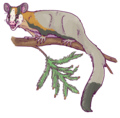| Theriiformes Temporal range:
| |
|---|---|

| |
| Skull of the multituberculate Ptilodus ( Allotheria) | |

| |
| Skeleton of Maotherium ( Trechnotheria) | |
|
Scientific classification
| |
| Domain: | Eukaryota |
| Kingdom: | Animalia |
| Phylum: | Chordata |
| Class: | Mammalia |
| Clade: | Theriimorpha |
| Clade: |
Theriiformes Rowe, 1988 |
| Subgroups | |
Theriiformes is a clade of mammals. The term was coined by Timothy B. Rowe in his doctoral dissertation, [1] and is defined as the clade formed by the most recent common ancestor of multituberculates (which form part of the broader group Allotheria, along with Gondwanatheria and likely all/part of Haramiyida) and Theria (the group containing marsupials and placentals). [2] Mammals more closely related to therians than to multituberculates are included in the clade Trechnotheria. [3] As multituberculates are usually considered more closely related to therians than monotremes are, it is considered to be a subgroup of the mammalian crown group. [4]
The cladogram below follows Luo et al. (2016): [5]
References
- ^ Rowe, T. (1988). "Definition, diagnosis, and origin of Mammalia". Journal of Vertebrate Paleontology. 8 (3): 241–264. doi: 10.1080/02724634.1988.10011708.
- ^ Zachos, Frank; Asher, Robert, eds. (2018-10-22). Mammalian Evolution, Diversity and Systematics. De Gruyter. ISBN 978-3-11-034155-3.
- ^ Macrini, T. E.; Rougier, G. W.; Rowe, T. (2007). "Description of a Cranial Endocast from the Fossil Mammal Vincelestes neuquenianus (Theriiformes) and its Relevance to the Evolution of Endocranial Characters in Therians". The Anatomical Record: Advances in Integrative Anatomy and Evolutionary Biology. 290 (7): 875–892. doi: 10.1002/ar.20551.
- ^ Macrini, Thomas E.; Rougier, Guillermo W.; Rowe, Timothy (July 2007). "Description of a Cranial Endocast from the Fossil MammalVincelestes neuquenianus (Theriiformes) and its Relevance to the Evolution of Endocranial Characters in Therians". The Anatomical Record: Advances in Integrative Anatomy and Evolutionary Biology. 290 (7): 875–892. doi: 10.1002/ar.20551.
- ^ Luo, Zhe-Xi; Schultz, Julia A.; Ekdale, Eric G. (2016). "Evolution of the Middle and Inner Ears of Mammaliaforms: The Approach to Mammals". In Clack, Jennifer A.; Fay, Richard R.; Popper, Arthur N. (eds.). Evolution of the Vertebrate Ear. Vol. 59. pp. 139–174. doi: 10.1007/978-3-319-46661-3_6.
| Theriiformes Temporal range:
| |
|---|---|

| |
| Skull of the multituberculate Ptilodus ( Allotheria) | |

| |
| Skeleton of Maotherium ( Trechnotheria) | |
|
Scientific classification
| |
| Domain: | Eukaryota |
| Kingdom: | Animalia |
| Phylum: | Chordata |
| Class: | Mammalia |
| Clade: | Theriimorpha |
| Clade: |
Theriiformes Rowe, 1988 |
| Subgroups | |
Theriiformes is a clade of mammals. The term was coined by Timothy B. Rowe in his doctoral dissertation, [1] and is defined as the clade formed by the most recent common ancestor of multituberculates (which form part of the broader group Allotheria, along with Gondwanatheria and likely all/part of Haramiyida) and Theria (the group containing marsupials and placentals). [2] Mammals more closely related to therians than to multituberculates are included in the clade Trechnotheria. [3] As multituberculates are usually considered more closely related to therians than monotremes are, it is considered to be a subgroup of the mammalian crown group. [4]
The cladogram below follows Luo et al. (2016): [5]
References
- ^ Rowe, T. (1988). "Definition, diagnosis, and origin of Mammalia". Journal of Vertebrate Paleontology. 8 (3): 241–264. doi: 10.1080/02724634.1988.10011708.
- ^ Zachos, Frank; Asher, Robert, eds. (2018-10-22). Mammalian Evolution, Diversity and Systematics. De Gruyter. ISBN 978-3-11-034155-3.
- ^ Macrini, T. E.; Rougier, G. W.; Rowe, T. (2007). "Description of a Cranial Endocast from the Fossil Mammal Vincelestes neuquenianus (Theriiformes) and its Relevance to the Evolution of Endocranial Characters in Therians". The Anatomical Record: Advances in Integrative Anatomy and Evolutionary Biology. 290 (7): 875–892. doi: 10.1002/ar.20551.
- ^ Macrini, Thomas E.; Rougier, Guillermo W.; Rowe, Timothy (July 2007). "Description of a Cranial Endocast from the Fossil MammalVincelestes neuquenianus (Theriiformes) and its Relevance to the Evolution of Endocranial Characters in Therians". The Anatomical Record: Advances in Integrative Anatomy and Evolutionary Biology. 290 (7): 875–892. doi: 10.1002/ar.20551.
- ^ Luo, Zhe-Xi; Schultz, Julia A.; Ekdale, Eric G. (2016). "Evolution of the Middle and Inner Ears of Mammaliaforms: The Approach to Mammals". In Clack, Jennifer A.; Fay, Richard R.; Popper, Arthur N. (eds.). Evolution of the Vertebrate Ear. Vol. 59. pp. 139–174. doi: 10.1007/978-3-319-46661-3_6.




